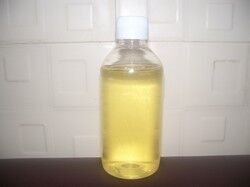Foaming Agent
We are the stalwarts in the domain of manufacturing, supplying, wholesaling, and exporting Foaming Agent These flavor grade chemicals are processed using pure and accurate ingredients that are procured from reliable and trusted vendors of the market. Our range is available in the market at leading prices in packs of different quantities.
Foaming Agents are chemical additives used in various construction applications to create a foam or air-entrained mixture. The introduction of air bubbles into concrete, mortar, or other materials can provide several benefits, including improved workability, reduced density, increased insulation properties, and enhanced durability. Here are some common applications and uses of foaming agents in construction:
Lightweight Concrete: Foaming agents are extensively used in the production of lightweight concrete, also known as cellular concrete or foamed concrete. The addition of a foaming agent creates a cellular structure within the concrete, reducing its weight while maintaining strength. Lightweight concrete is commonly used in applications where weight reduction is desired, such as in precast elements, floor and roof toppings, and insulation panels.
Insulation: Foaming agents can be used to produce foam concrete or aerated concrete blocks, which offer excellent thermal insulation properties. These lightweight blocks have high insulation value, making them suitable for construction projects where energy efficiency and thermal comfort are important, such as in walls, floors, and roofs.
Filling Voids: Foaming agents are useful for filling voids, cavities, and gaps in construction. The foamed mixture can easily flow and fill complex shapes, providing a uniform and stable fill material. This application is commonly used for backfilling underground structures, filling abandoned pipes, and stabilizing soil.
Tunneling and Mining: Foaming agents are employed in tunneling and mining operations for various purposes. They can be used to create a lightweight backfill material to reduce the load on structures, as well as to stabilize loose or collapsing soil during excavation. Foaming agents can also be used to produce foam mortars or grouts for filling voids and stabilizing the ground.
Roofing Systems: Foaming agents are used in the production of foam adhesives and coatings for roofing applications. These foams provide excellent adhesion, reduce weight, and offer enhanced thermal insulation properties. Foam roofing systems are commonly used for flat or low-slope roofs and can help improve energy efficiency.
Crack Filling and Repair: Foaming agents can be used for crack filling and repair in concrete structures. By injecting a foamed mixture into cracks, the material can expand and fill the voids, providing structural stability and preventing further damage. Foaming agents used for this purpose often include special additives to enhance adhesion and bonding with the existing concrete.
Fire Protection: Foaming agents can be incorporated into fire-resistant materials and coatings to improve their insulating properties. These materials can help delay the spread of fire and reduce heat transfer in case of a fire incident, providing valuable fire protection to buildings and structures.
These are just a few examples of the applications and uses of foaming agents in the construction industry. The specific type and formulation of the foaming agent may vary depending on the desired properties and requirements of the project. It’s important to consult with experts and follow manufacturer guidelines when using foaming agents to ensure their proper application and achieve desired results.
